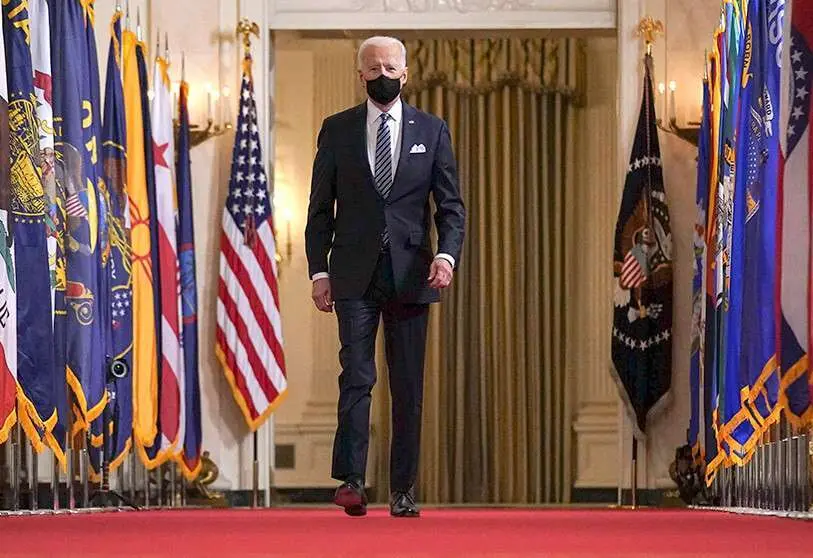100 days of the Biden administration: progressivism in a polarised environment

The first quarter Biden's term in office are coming to an end and Americans have already shown their opinion of the government in a poll proposed by NBC. According to the poll, 53% of Americans approve of Biden's performance over the last few months. This result reflects the fact that support for the new government is higher than for Donald Trump at this time. However, another poll promoted by The Economist reveals that 74% of conservative voters still do not recognise his victory.
In this sense, Biden has had to contend with a Senate where the Republican opposition controls half of the seats. This means that some initiatives on immigration, racism and police abuses have been truncated by conservative opposition. It should be remembered that Joe Biden took office in the midst of a social crisis marked by the assault on the Capitol on 6 January this year, revealing the strong polarisation that currently exists in US society. This polarisation has been transferred to the White House, where conservatives and liberals are trying to impose themselves on each other in order to carry out different economic and social policies. The Republican presence in the Senate is high, while the liberal wing in the lower house is still quite small.
But what are the measures that have catapulted the president to achieve broad social acceptance by the population? First of all, the measures adapted in the fight against COVID-19 have been successfully implemented, as half of the adult population has been vaccinated against the virus. According to The Washington Post, almost 20% of the population has been fully vaccinated, which means that 66 million people are now protected against COVID.

These measures have led to the US allowing people to go outdoors without masks, except when there are crowds of people. According to the director of the Center for Disease Control and Prevention, Rochelle Walensky, "there are many situations where fully vaccinated people do not need to wear masks if they are outdoors".
In this regard, Biden signed executive orders at a faster pace than any president since Harry Truman's presidency. Many of these orders have focused on combating the pandemic. Compared to other presidents, Trump signed 33 executive orders over the same period while Barack Obama signed 19. In addition, Biden has reversed 62 of the 219 orders issued by Trump, including restoring the US commitment to the Paris climate agreement.

In terms of social policies, the House passed a package of measures focused on reducing poverty with a budget of 1.9 trillion dollars focused on this purpose. According to a poll by the Pew Center, 67% of Americans would be in favour of this package of measures signed by the president.
On immigration policy, Biden has reversed some of the toughest policies issued by Trump. The current president has halted construction of Trump's border wall and reversed the travel ban on 13 Muslim-majority African countries after taking office. However, problems related to waves of immigration between the US-Mexico border remain one of the main issues with a sharp increase in migrant arrivals.
On foreign policy, Biden has responded forcefully against the "enemies of the United States". In this regard, he has imposed sanctions on Russia in response to Moscow's interference in the 2020 elections and a massive cyber-attack attributed to the country, as well as publicly describing Vladimir Putin as 'murder'.

Similarly, Biden has maintained the Trump presidency's sanctions on Iran and refused to lift them as a condition for engaging Tehran in direct negotiations over its nuclear programme.
In this vein, he has retained trade tariffs on China and allowed US diplomats to visit Taiwan. Alongside this, he has stepped up pressure on China over its treatment of the Uighurs in Xinjiang province. Alongside this, relations with Turkey have seen an escalation of tension after publicly acknowledging the Armenian genocide perpetrated in 1915 by the Ottoman Empire. This statement has infuriated Erdogan, who warned that this recognition will have a "destructive impact" on relations between the two countries.

In the Middle East, Biden has not changed any of the policies approved by Trump, although the State Department has returned to talk of "occupied territories" when referring to the West Bank and Gaza.
Biden will appear on Thursday to recap all the achievements of the last 100 days in the state of Georgia, where he won by 12,000 votes and managed to win the two seats in January that opened the door to governability. We will see over time how the president deals with the social challenges related to the polarisation of US politics, as well as how he deals with the new opportunities that are opening up for the country in terms of international cooperation, unlike Trump after rejecting cooperation with many states.








